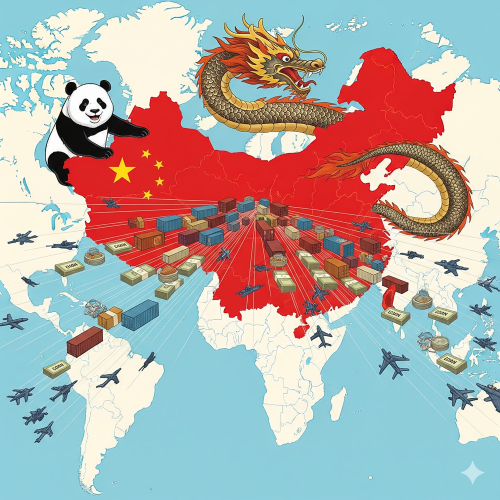How does China balance cooperation with Europe while competing with the U.S. for global dominance?

China navigates the complex relationship with Europe by strategically balancing cooperation and competition to prevent the EU from fully aligning with the U.S. against it.
Beijing's approach is based on an official narrative of mutual benefit and partnership, while it simultaneously uses its economic power to gain political leverage and influence.
The "Partner, Competitor, and Systemic Rival" Framework
The EU officially defines its relationship with China using a three-part framework: a partner for cooperation, an economic competitor, and a systemic rival for values and governance. China skillfully leverages this framework to its advantage.
-
Partner for Cooperation: China emphasizes its role as a partner on global issues like climate change and the environment. It seeks to present itself as a responsible stakeholder and a key player in multilateral institutions. By engaging with Europe on these issues, Beijing can showcase its commitment to global governance and counter U.S. narratives of Chinese isolationism. This cooperation also provides a platform to improve diplomatic relations and build goodwill.
-
Economic Competitor: While the EU views China as a competitor due to a massive trade deficit and unfair trade practices, China frames the relationship as mutually beneficial. It highlights the vast opportunities its market offers to European companies and the benefits of cheap Chinese goods for European consumers. China also seeks to position itself as a key investor in Europe, particularly through its Belt and Road Initiative (BRI), which aims to improve trade connectivity and create a new logistical network.
-
Systemic Rival: This is the most contentious part of the relationship. The EU is concerned about China's human rights record, its authoritarian model of governance, and its growing military and diplomatic assertiveness. China counters this by accusing Europe of having a "Cold War mentality" and insists that there is "no fundamental conflict of interest or geopolitical conflicts between China and the EU," as Chinese Foreign Minister Wang Yi stated during a recent visit. This rhetoric aims to downplay ideological differences and encourage a focus on economic pragmatism.
Leveraging Economic Power and Internal EU Divisions
China's most effective tool in its trilateral relationship is its economic power, which it uses to influence individual EU member states and exploit internal divisions.
-
"Divide and Conquer" Diplomacy: China often bypasses the EU as a bloc and engages directly with individual member states. This is especially effective with nations that are more dependent on Chinese investment or are ideologically aligned with Beijing. Countries like Hungary and Serbia have received significant Chinese funding for infrastructure projects and have, in turn, helped to block or water down EU statements critical of China's human rights record or geopolitical actions. This strategy successfully prevents the EU from presenting a united front against China, which is a key goal for Beijing.
-
Economic Coercion: Beijing uses its economic might as both a carrot and a stick. When a country, like Lithuania, challenges a Chinese "red line," China can respond with economic coercion, such as unofficial trade boycotts and import restrictions. This serves as a warning to other EU members that aligning too closely with the U.S. on China policy could have serious economic consequences.
-
Market Access as a Tool: China's massive market is a powerful incentive for European companies, particularly in Germany's automotive sector. The fear of losing market access makes these companies powerful lobbyists against any policies that could provoke a negative response from Beijing. This economic dependency on the Chinese market creates a buffer that prevents European governments from fully aligning with Washington's more confrontational stance.
The Trilateral Dynamic: A Strategic Balancing Act
China’s strategy in the trilateral relationship is a delicate balancing act. It seeks to prevent a unified front between the EU and the U.S. while keeping a strong, but controlled, relationship with Europe.
-
Countering U.S. Containment: The U.S. has made it a priority to build a common front with its European allies to counter what it sees as China's hegemonic ambitions. China's main goal is to prevent this from happening. By promoting dialogue, trade, and investment with Europe, China aims to show that a partnership with it is a more viable and beneficial option for Europe than simply being a pawn in the U.S.'s containment strategy.
-
Promoting "Strategic Autonomy": China has openly supported the EU's push for "strategic autonomy," an idea that has been gaining traction in Europe. Beijing sees a more independent Europe as one that is less likely to blindly follow Washington's lead on issues like trade, technology, and security.
-
Highlighting U.S.-EU Tensions: China is quick to highlight any tensions between the U.S. and Europe, whether on trade issues or geopolitical strategy. This reinforces its narrative that the U.S. is not a reliable or consistent partner and that Europe should prioritize its own interests.
In conclusion, China's balancing act with Europe is a key component of its global strategy to compete with the U.S. By emphasizing cooperation, leveraging economic power, and exploiting internal divisions, China effectively complicates the U.S.'s efforts to build a unified alliance, while simultaneously securing its own economic and political goals on the world stage.
- Questions and Answers
- Opinion
- Motivational and Inspiring Story
- Technology
- Live and Let live
- Focus
- Geopolitics
- Military-Arms/Equipment
- Безопасность
- Economy
- Beasts of Nations
- Machine Tools-The “Mother Industry”
- Art
- Causes
- Crafts
- Dance
- Drinks
- Film/Movie
- Fitness
- Food
- Игры
- Gardening
- Health
- Главная
- Literature
- Music
- Networking
- Другое
- Party
- Religion
- Shopping
- Sports
- Theater
- Health and Wellness
- News
- Culture

